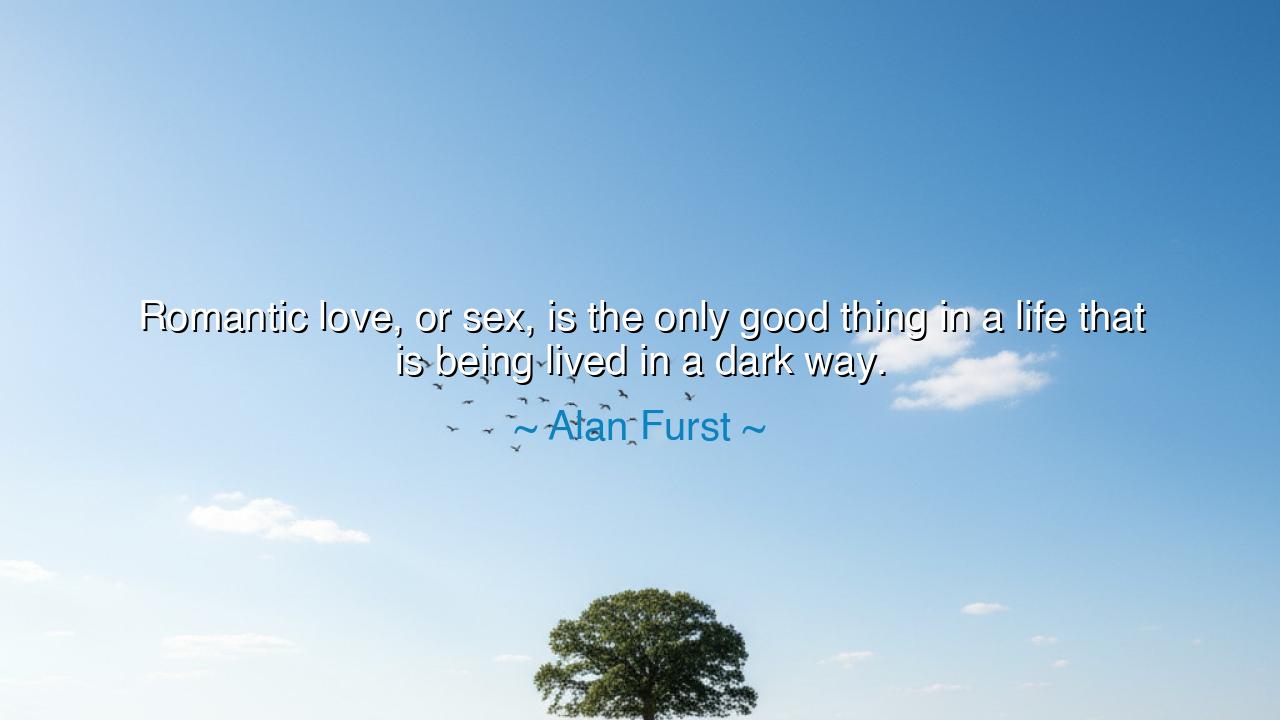
Romantic love, or sex, is the only good thing in a life that is
Romantic love, or sex, is the only good thing in a life that is being lived in a dark way.






“Romantic love, or sex, is the only good thing in a life that is being lived in a dark way.” Thus speaks Alan Furst, whose novels often dwell in the shadows of war, betrayal, and intrigue. His words are not idle, but born of contemplation on the human spirit when surrounded by despair. For when a life is steeped in darkness, when oppression, loneliness, or fear consume the days, it is the spark of romantic love—or the raw intimacy of sex—that cuts through the gloom and reminds the soul that it still lives, still burns, still belongs to something greater than despair.
In times of shadow, every small joy grows luminous. To those living freely, love may seem but one delight among many. But to those trapped in fear, poverty, or exile, love is not merely pleasant—it is salvation. For to feel desired, to hold another close, to know that even for an hour one is not abandoned to the void, is to touch upon a goodness deeper than survival. This is the essence of Furst’s words: that romantic love becomes a light in the tunnels of existence, the single reminder that humanity still carries beauty even when the world is cruel.
History is heavy with examples of this truth. During the long nights of the Second World War, in cities like Paris under occupation, lovers met in secret, defying curfews, risking discovery, clinging to one another as though passion itself were rebellion. To kiss in the darkened streets was not only desire but defiance: an assertion that tyranny could not erase tenderness. In these moments, love was more than pleasure—it was proof that even in ruin, the human heart could not be conquered.
The ancients also knew this. In the myth of Orpheus and Eurydice, Orpheus descends into Hades, into the very heart of shadow, for the sake of love. Surrounded by death, he sings, and his song awakens even the stones of the underworld. Though the tale ends in sorrow, the truth is clear: in the darkest places, love is the one force that resists annihilation, the one good thing that endures when all else fades.
Furst’s insight carries both warning and hope. It warns us that there are lives lived in darkness, where joy is scarce and pain abundant. But it also reminds us that no matter how bleak the hour, romantic love or intimacy can pierce that gloom like flame through mist. It is the thread that ties us to meaning, when work, politics, or even faith seem too distant to grasp. To love and to be loved, even briefly, is to know that life still holds goodness worth fighting for.
The lesson is thus: do not scorn the power of love as something trivial, nor reduce intimacy to mere indulgence. Recognize it as medicine for the weary soul, a flame that keeps despair from devouring us whole. When you live through hardship, seek out connection, for it is not weakness but strength to lean on another. And when you are far from despair, treasure your moments of passion all the more, for they may be the anchor you cling to in darker days.
Therefore, dear listener, remember Alan Furst’s wisdom: when life turns dark, do not surrender to the shadows. Seek the one light that endures—the warmth of another’s hand, the intimacy of love, the fire of passion that proves you are still alive. In such moments, no matter how brief, you will find a goodness more radiant than the gloom around you, a reminder that the human heart was made not merely to endure, but to burn with love even in the darkest night.






AAdministratorAdministrator
Welcome, honored guests. Please leave a comment, we will respond soon